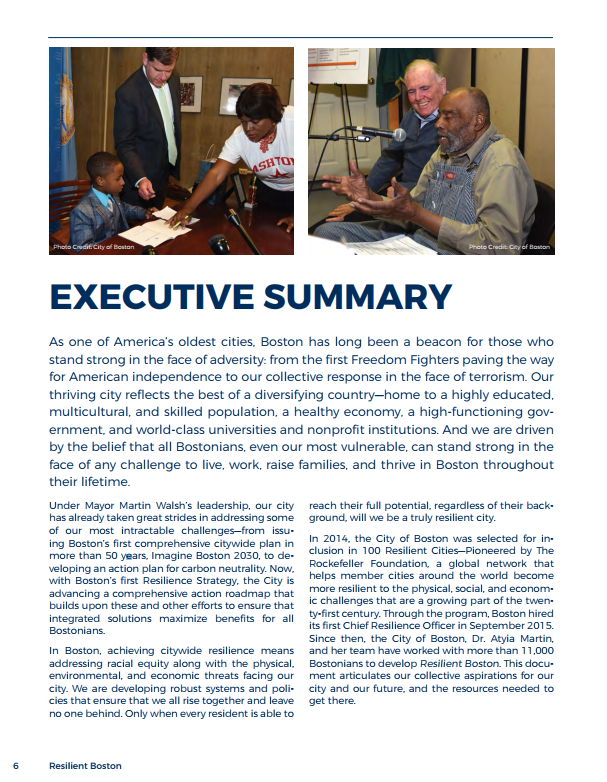Boston Mayor: ‘A truly resilient city is one that works to achieve equity’
Boston’s first strategy for advancing resilience and racial equity across the city, Resilient Boston: An equitable and connected city, was unveiled by Mayor Marty Walsh on Thursday.
“Our engagement with race can no longer be isolated from our decisions and actions regarding other issues,” Mayor Walsh stressed in a letter introducing the strategy. “In addressing the divisions of race in our city, we will be leveraging our diversity as a resource to strengthen our city as a whole. To that end, we are creating an open, honest, and continual dialogue. This is important now more than ever.”
The 154-page document outlines four ‘visions’: Reflective City, Stronger People; Collaborative, Proactive Governance; Equitable Economic Opportunity; and Connected, Adaptive City. The topics addressed under these pillars touch on several resilience-related issues including: connecting Bostonians to reflect and confront racial inequity; increasing access to mental health and trauma resources; improving city employment equity; removing barriers facing small business and entrepreneurs; addressing housing challenges; increasing access to broadband and Wi-Fi; advancing resilient transportation systems; adapting for extreme heat; and protecting vulnerable communities from flooding.
“A truly resilient city is one that works to achieve equity: ensuring that vital services reach all residents, including the most vulnerable; providing access to opportunity for all; and actively fostering cohesive communities,” writes Mayor Walsh. “Today, Boston is taking a major step toward achieving what is possible when we truly recognize and confront our deepest challenges. While we celebrate this seminal achievement, we also acknowledge that now begins the hard work of making resilience a reality.”
Boston’s new strategy follows a public forum held by the City in November 2016, “Boston Talks About Racism,” which officials say was attended by over 600 residents and served as the start to a citywide conversation about racism.
A preview of Boston’s resilience strategy was released by Mayor Walsh at the forum.
Resilient Boston An Equitable and Connected City was published by the Mayor’s Office of Resilience & Racial Equity in partnership with the Rockefeller Foundation’s ‘100 Resilient Cities’ initiative.
“Rather than merely a symbolic gesture, or words printed on a page, only this kind of dialogue, with deep and searching honesty, can help the city develop meaningful resilience amid its many current and future challenges,” Mayor Walsh writes in the foreword. “Dr. Martin worked tirelessly to ensure that the voices and concerns of all Bostonians are reflected in our vision for the future.”
At Northeastern University, the Global Resilience Institute (GRI) has been established as a University-wide initiative involving all nine colleges, with the mission of informing and advancing societal resilience around the world. GRI employs a seasoned group of leaders with deep operational expertise and combines this operational perspective with collaborative research involving international research institutes and universities.
At the start of the summer, GRI funded 11 interdisciplinary resilience research projects tackling a wide array of critical resilience issues, including equity, healthy aging, terrorism, infrastructure, energy and coastal adaptation. Each collaboration involves faculty members from two or more Northeastern colleges.
To view Boston’s full resilience strategy CLICK HERE
[Featured image courtesy: AlexiusHoratius (Own work) [CC BY-SA 3.0 (http://creativecommons.org/licenses/by-sa/3.0)], via Wikimedia Commons]

